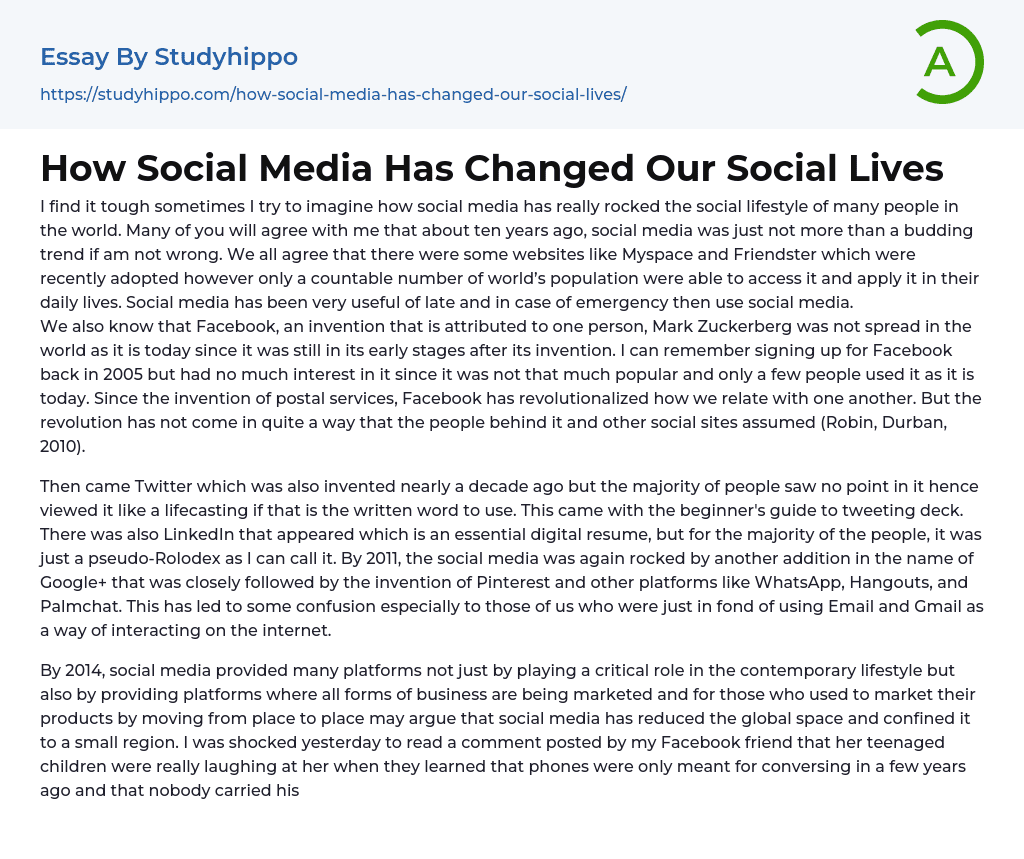

How Social Media Has Changed Our Social Lives Essay Example
The impact of social media on the global social lifestyle is difficult for me to fully grasp. About ten years ago, platforms like Myspace and Friendster were just emerging, but only a few people had access to them regularly. Nowadays, social media has become incredibly advantageous and can even be used in times of emergency.
Initially, Facebook, founded by Mark Zuckerberg, did not have the popularity it has today. In 2005, when I personally joined Facebook, it wasn't widely used and didn't capture my attention. However, the way we connect with others through Facebook was greatly transformed with the introduction of postal services. Despite this, the revolution brought about by Facebook and other social platforms didn't happen as expected by their creators and other platforms (Robin, Durban, 2010).
Nearly a decade ago, Twitter was invented, but many people di
...dn't see its purpose and considered it similar to lifecasting. Along came the beginner's guide to tweeting deck. LinkedIn also emerged as a crucial digital resume, but for most people, it was nothing more than a pseudo-Rolodex. In 2011, the social media world was once again shaken by the introduction of Google+. This was followed closely by the creation of Pinterest and other platforms including WhatsApp, Hangouts, and Palmchat.
The rise of social media has brought confusion to those who were accustomed to using Email and Gmail for internet communication. In 2014, social media not only became a crucial part of our modern lifestyle but also provided platforms for business marketing. This shift meant that individuals who previously marketed their products in person discovered that social media had reduced the global space and confined it to a smaller region. Recently
I came across a Facebook comment from my friend where she mentioned her teenage children's amusement upon learning that phones were originally used solely for conversations and people did not carry them around 15 to 20 years ago. It is clear that social media has revolutionized the global space, allowing people to connect with individuals from different continents on platforms like Facebook and WhatsApp. Online interactions and profile representations have eliminated the necessity of physical presence in order to form friendships (Kate Beals). Social media has expanded our network beyond just neighbors and relatives.
Thanks to technology, individuals can now have friends from all corners of the globe without ever meeting in person. This allows for easy connection and idea sharing, as if they were physically sitting together at a table. In contrast, in the past, people relied on local villages and nearby communities to find potential marriage partners. Ancestors maintained lifelong relationships with the same individuals. However, due to increased mobility nowadays, even our closest companions can be lost (Robin, Dunbar). Previously, some would patiently wait to meet their future spouses at work. But society has undergone significant changes in recent years.
The days of using traditional methods to find spouses or jobs are behind us. With Facebook, we can easily connect with people globally and share pictures to establish relationships that may result in marriages. No longer do we need to carry around physical resumes or visit multiple offices to search for job opportunities.
LinkedIn, a social media platform, has led to the reason for this change. It enables individuals to showcase their academic and work achievements in their profile, facilitating connections with employers from different
countries. Furthermore, social media plays a crucial role in emergency management by offering a platform to disseminate immediate information. Consequently, it serves as an invaluable resource for staying informed about current events and eliminates the need for dependence on radio or television.
Logging into Facebook allows individuals to conveniently access national and international news shared by friends worldwide. This offers an efficient way of receiving urgent updates, as event attendees can simply post the news for global sharing through their network (Morin, Dave, 2010). Social media platforms also enable capturing personal moments and effortlessly sharing them with a select group of 50 close friends and family members who hold significant importance in one's life.
However, it is important to acknowledge that any advantage inevitably brings disadvantages. One drawback of social media is the potential backlash one may face. While jokes among friends may be acceptable, those intended for a wider audience can pose risks. For instance, sharing inaccurate information about topics like religion or politics has the potential to infringe upon specific groups' rights.
The rise in cyber bullying and crimes targeting children is a connected issue of social media, as it exposes them to random interactions and harassment. Additionally, there exists a risk of fraud and identity theft associated with social media. Furthermore, it is addictive and consumes a significant amount of time. However, despite these challenges, I personally have a strong affection for social media because it has the ability to transform lives and connect people without requiring physical travel.
Work Cited
- Beals, Kate. “Faceless on Facebook.” What Matters in America. Ed. Gary Goshgarian, 3rd ed. Boston: Pearson, 2012. (46-47).
2014. Retrieved 20 May 2014.
Morins, Dave. “Paths Founder” What Matters in America. Ed. Gary Goshgarian, 3rd ed.
Boston: Pearson, 2012. (46-47).
Robin, Dunbar. “How Many Friends Does One Person Need?” What Matters in America. Ed.Gary Goshgarian, 3rd ed. Boston: Pearson, 2010. (44-45).
- Anthropology essays
- Audience essays
- Charity essays
- Cultural Competence essays
- Emile Durkheim essays
- Gender Roles essays
- Generation essays
- Globalization essays
- Interpersonal Relationship essays
- People essays
- Race essays
- Social Change essays
- Social Class essays
- Social Movement essays
- Social Science essays
- Social Status essays
- Social Stratification essays
- Society essays
- Sociological Imagination essays
- Sociological Perspective essays
- Sociological Theories essays
- Stereotypes essays
- Web Dubois essays



